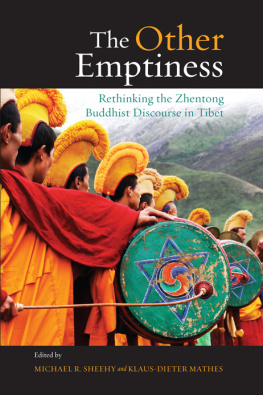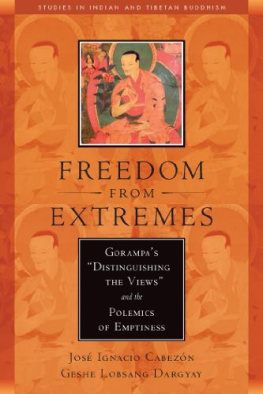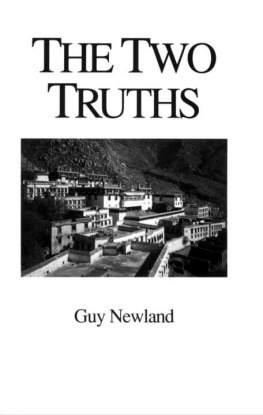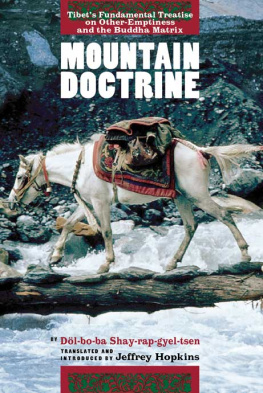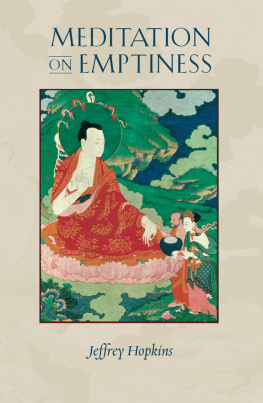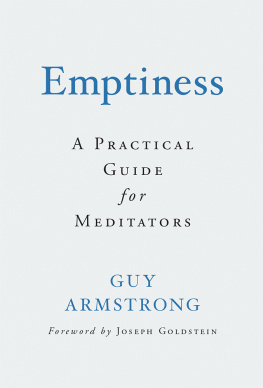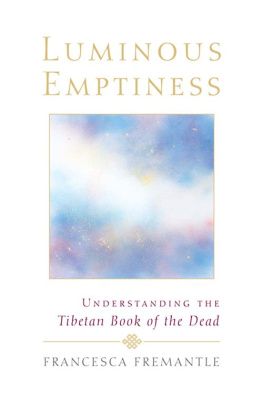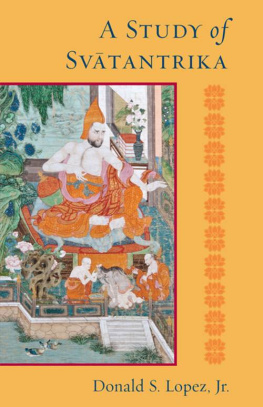The Other
Emptiness
The Other
Emptiness
R ETHINKING THE Z HENTONG
B UDDHIST D ISCOURSE IN T IBET
Edited by
MICHAEL R. SHEEHY and KLAUS-DIETER MATHES
Cover photograph by Michael R. Sheehy
Published by
State University of New York Press, Albany
2019 State University of New York
All rights reserved
Printed in the United States of America
No part of this book may be used or reproduced in any manner whatsoever without written permission. No part of this book may be stored in a retrieval system or transmitted in any form or by any means including electronic, electrostatic, magnetic tape, mechanical, photocopying, recording, or otherwise without the prior permission in writing of the publisher.
For information, contact State University of New York Press, Albany, NY
www.sunypress.edu
L IBRARY OF C ONGRESS C ATALOGING-IN -P UBLICATION D ATA
Names: Sheehy, Michael R, [date ] editor. | Mathes, Klaus-Dieter, editor.
Title: The other emptiness : rethinking the Zhentong Buddhist discourse in Tibet / edited by Michael R. Sheehy and Klaus-Dieter Mathes.
Description: First edition. | Albany : State University of New York Press, 2020. | Includes bibliographical references and index.
Identifiers: LCCN 2019037744 (print) | LCCN 2019037745 (ebook) | ISBN 9781438477572 (hardcover) | ISBN 9781438477596 (ebook)
Subjects: LCSH: Sunyata | BuddhismChinaTibet Autonomous RegionDoctrines.
Classification: LCC BQ4275 .O58 2020 (print) | LCC BQ4275 (ebook) | DDC 294.3/420423dc23
LC record available at https://lccn.loc.gov/2019037744
LC ebook record available at https://lccn.loc.gov/2019037745
10 9 8 7 6 5 4 3 2 1
Contents
Klaus-Dieter Mathes and Michael R. Sheehy
David Higgins
Tsering Wangchuk
Michael R. Sheehy
Dorje Nyingcha
Klaus-Dieter Mathes
Martina Draszczyk
Yaroslav Komarovski
Klaus-Dieter Mathes
Matthew T. Kapstein
Douglas Duckworth
Dorji Wangchuk
Marc-Henri Deroche
Michael R. Sheehy
Acknowledgments
This anthology on zhentong was several years in the making. The concept for this book first emerged with a conversation between Michele Martin and Michael Sheehy, and Michele kindly made the connection with State University of New York Press. The coeditors discussed the book in 2010 during the twenty-second congress of the International Association for Tibetan Studies in Vancouver. During that conference, Klaus-Dieter Mathes convened a panel on The History of the Rang-stong / Gzhan-stong Distinction from Its Beginning through the Ris-med Movement, which included many of the authors contributing to the present volume. The proceedings of this panel were published in the Journal of Buddhist Philosophy 2 (2016): 4131. The following year, Michael Sheehy convened a similar panel on Rang stong / Gzhan stong : Perspectives on the Discourse in India and Tibet at the sixteenth congress of the International Association of Buddhist Studies at Dharma Drum Buddhist College in Taipei, Taiwan. Though not all of the presenters in this panel are authors in this volume, and not all of the chapters by the authors in this volume were presented at the conference, it considerably helped to further organize the current authors into a cohort that catalyzed the contributions published in this book.
The editors would like to acknowledge and express their gratitude to the late Nancy Ellegate at State University of New York Press for taking an interest in publishing this volume, and for whimsically suggesting the title, The Other Emptiness , based on the literal translation (being empty of other) of the topic that was mentioned offhand in an early conversation about the project. We would also like to thank James Peltz, codirector at State University of New York Press, for keeping the project alive after Nancys untimely passing. And finally, we thank Christopher Ahn, senior acquisitions editor at the press, for his commitment to publishing this volume as quickly as possible. Last but not least, we would also like to express our gratitude to Michele Martin for critically reading the introduction.
Introduction
The Philosophical Grounds and Literary History of Zhentong
K LAUS -D IETER M ATHES AND M ICHAEL R. S HEEHY
Though the subject of emptiness ( nyat , stong pa nyid ) is relatively well established in English-language texts on Buddhism, it is usually presented only as the emptiness of lacking independent existence or, more literally, the emptiness of an own nature ( svabhva , rang bzhin ). However, the general reader of English literature on Buddhism may not be aware that such an understanding of emptiness reflects a particular interpretation of it, advanced predominantly by the Sakya, Kadam, and Geluk orders, which has exercised a particularly strong influence on the dissemination of Buddhist studies and philosophy in the West. In Tibetan discourse, this position is referred to as rangtong ( rang stong ), which means that everything, including the omniscience of a Buddha, is taken to be empty of an own nature. It is this lack of independent, locally determined building blocks of the world that allows in Madhyamaka the Buddhist axiom of dependent origination. In other words, rangtong emptiness is the a priori condition for a universe full of open, dynamic systems. The union of dependent origination and emptinessthe inseparability of appearance and emptinesssets the ground for philosophical models of interrelatedness that are increasingly used in attempts to accommodate astonishing observations being made in the natural sciences, such as wave-particle duality or quantum entanglement.
Throughout the long intellectual history of Indian and Tibetan Buddhism, one of the major questions that remains unresolved is whether a systematic presentation of the Buddhas doctrine requires challenging rangtong as the exclusive mode of emptiness, which has led some to distinguish between two modes of emptiness: (1) Rangtong (rang stong) , that is, being empty of an own nature on the one hand, and (2) Zhentong (gzhan stong) , that is, being empty of everything other than luminous awareness or buddha-nature ( tathgatagarbha , de bzhin gshegs pai snying po ). In later Indian and Tibetan Buddhism, when such tensions emerged, the issue was not so much about a possible justification for this distinction on the basis of certain philosophical scriptures, but rather competing hermeneutical schemes that consistently interpret the entire corpus of what was accepted to be the words of the Buddha.
While proponents of zhentong ( zhentongpas ) underline the necessity of this empty of other emptiness, the followers of rangtong ( rangtongpas ) oppose it. Rangtongpas insist that one must follow the seventh-century Indian Buddhist scholar Candrakrtis lead in taking the second turning cycle of teachings, which he defines as exclusively emphasizing rangtong emptiness, to be the underlying intention of any positive statement about the ultimate. Zhentongpas do not consider themselves in direct opposition to Candrakrti but follow a strategy of inclusivism. Within their system, rangtong is understood to be a necessary basis for a correct realization of zhentong. Even though they repeatedly describe ultimate truth or reality as possessing qualities that are not empty of their own nature, it is critical to realize that these are beyond mental fabrications or reifications that are empty of an own nature as in the rangtong system.

